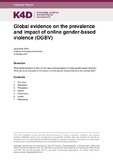| dc.contributor.author | Hicks, Jacqueline | |
| dc.date.accessioned | 2021-12-03T09:04:21Z | |
| dc.date.available | 2021-12-03T09:04:21Z | |
| dc.date.issued | 2021-10-08 | |
| dc.identifier.citation | Hicks, J. (2021). Global evidence on the prevalence and impact of online gender-based violence. K4D Helpdesk Report. Institute of Development Studies. DOI:10.19088/K4D.2021.140 | en |
| dc.identifier.uri | https://opendocs.ids.ac.uk/opendocs/handle/20.500.12413/16983 | |
| dc.description.abstract | This rapid review updates a previous report (Fraser and Martineau-Searle, 2018) with evidence from 2018 onwards. It finds an evidence base on online gender-based violence (OGBV) covering a wider range of countries than the previous report.
Some key findings on the nature and prevalence of OGBV include: The most recent surveys show a prevalence of OGBV ranging from 16% to 58%; Men and boys also experience online abuse in high numbers, but it is less likely to be gender-based; Several studies from different countries identify Facebook as the top location for incidents of OGBV; Higher levels of online harassment and abuse are faced by people with intersecting inequality factors; According to victim-survivors, perpetrators are more likely to be unknown and acting alone, but large numbers are known to the victims. Perpetrators themselves report divergent, multifaceted and often over-lapping motivations for their actions; Analysis of underlying drivers of OGBV highlights an overarching theme of power and control, and heteronormative expectations around gender roles and sexual practice.
Many authors recommend that OGBV be understood as part of a continuum of abuse where normalised behaviours, such as sexual harassment in public spaces, shade into behaviours widely recognized as criminal, such as physical assault. The societal impact of OGBV includes: Media freedom is compromised; Democracy being undermined; Economic losses resulting from lost productivity; A ‘climate of unsafety’ prevails. Evidence base: The number of surveys about self-reported experiences with online harassment has increased rapidly. The majority of the research found during the course of this rapid review came from international and domestic non-governmental organisations and think-tanks. Academic research studies were also found, including several literature reviews. | en |
| dc.description.sponsorship | FCDO (Foreign, Commonwealth and Development Office) | en |
| dc.language.iso | en | en |
| dc.publisher | Institute of Development Studies | en |
| dc.relation.ispartofseries | K4D Helpdesk Report;1049 | |
| dc.rights.uri | https://www.nationalarchives.gov.uk/doc/open-government-licence/version/3/ | en |
| dc.subject | Children and Youth | en |
| dc.subject | Gender | en |
| dc.subject | Sexuality and Development | en |
| dc.subject | Social Protection | en |
| dc.title | Global Evidence on the Prevalence and Impact of Online Gender-based Violence (OGBV) | en |
| dc.type | Helpdesk | en |
| dc.rights.holder | © Crown copyright 2021 | en |
| dc.identifier.doi | 10.19088/K4D.2021.140 | |
| rioxxterms.funder | Default funder | en |
| rioxxterms.identifier.project | K4D | en |
| rioxxterms.version | VoR | en |
| rioxxterms.versionofrecord | 10.19088/K4D.2021.140 | en |
| rioxxterms.funder.project | 0986883a-6d0f-4bb8-9c46-5e0682934d65 | en |

